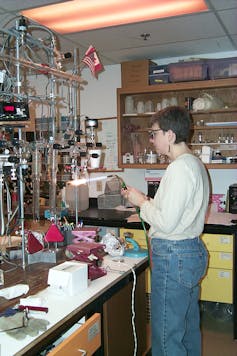In the late 1990s, I landed a position as a postdoctoral researcher at the storied Massachusetts Institute of Technology.
At first, I would turn up to work around 9 am, and would head home around 5 pm. But before too long, I noticed that many of the other scientists were already in at work by 9, and that the same people were still in the lab at 5.
“Hmm,” I thought. “I’m at MIT now. I need to lift my game.”
I began arriving an hour earlier, and staying an hour later. But at 8 am, the same people were already in working. And at 6 pm, they showed no signs of going home.
I’m the competitive sort, so I rose to the challenge. I cranked it up to 12-hour days, 7 am to 7 pm. But the same people were still in there before me and stayed after me.
This silent arms race escalated for another six months, at great personal strain.
But then I came to a realization. The additional hours were not translating into extra progress, but rather only into extra exhaustion. So I went back to working eight-hour days, before moving on a few years later to a faculty position at Harvard.
Almost 20 years later, I’m now an institute director at the University of Toronto. A big focus of my efforts is to boost the careers, well-being and success of my institute’s students and postdocs.
It was thus with some surprise and disappointment that I read this week some questionable career advice from another University of Toronto department head. My colleague argues that to reach his current senior position, he worked 16-17 hours per day as an early career scientist. He notes that his children spent weekends playing in the lobby, and that his wife (also a PhD scientist) did most of the parenting.
Like the infamous department email sent from the professors to the PhD students recommending 80-100 hour work weeks, this presents misleading and incorrect advice on how to succeed in research, in academia, and in careers and life in general.
Here are the actual facts.

Working longer hours leads to poorer productivity. If you’re trying to impress people and move up the ranks, the solution isn’t to work longer, but to work smarter. Learn to manage your time, to limit the endless spiral of emails and meetings, and to improve your efficiency.
The sustained schedule of 80- to 100-hour working weeks, which the macho male academic claims has got him where he is today, is a myth. Men exaggerate or misjudge the number of hours they work. There are simple apps and tools to track your productive working hours and working patterns: the answers may surprise you.
While it might be mathematically possible to work 17-hour days for extended periods, there are then huge compromises on diet, fitness and rest. However, poor nutrition, lack of exercise and bad sleep hygiene are all major contributing factors to depression and general ill health. Indeed, academics face big challenges around mental health. An attempt to raise productivity by sustained long hours is a Faustian bargain that can ultimately take its toll on you and those around you.

Science has a problem with women. While the fraction of female students in undergraduate science classes can sometimes be quite large, the numbers drop off sharply at each higher rung of the career ladder. This “leaky pipeline” already has many causes, without easy solutions. The reality is that parenting and caregiving roles are not evenly split by gender, even more so for scientists. Thus, if the scientific community follows the advice on working hours and parenting offered by my Toronto colleague, we are then even further fostering a culture that directly holds back talented women from successful scientific careers. And that limits the quality and breadth of ideas and discoveries.
Instead, the senior figures in science should be putting their energy into flexible career tracks, better part-time opportunities and extra support for those returning to the lab after parental leave. Scientists of any gender, whether parents or not, should be able to make choices around their investments in career and family, rather than be forced to compete with or accommodate outdated workaholic male stereotypes.
Those of us who are fortunate enough to have risen to senior academic positions have the privilege and responsibility of serving as mentors and role models to our junior colleagues. As young scientists learn the skills and approaches needed to become the science leaders of the future, they are deeply influenced by the advice of their lab heads and department chairs. So when someone asks me how many hours they should be working, I refuse to give them a number. Instead I tell them that they need to make sure they eat, sleep and relax, and that they should make time for their friends and families. Within those constraints, they need to figure out their optimal working hours for themselves.

Science demands a lot of its disciples, so scientists should take control, not be controlled. Young researchers should determine how, where and when they work best, should set themselves rules, and then should try to stick to them. Ever since my time as a postdoc at MIT, I aim to walk out the door by 5 or 6 every night, I try not to answer emails on weekends and I take my allotted vacation time. Just as heads and directors are expected to be exemplars in our research, we must lead by example in work–life balance.

